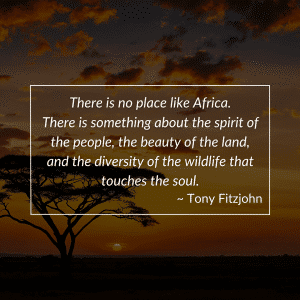Rightly so, the allure of African safaris captivates the imaginations of travelers worldwide, so it is essential to embrace and encourage ethical practices that prioritise the well-being of the continent’s magnificent wildlife. For travel agents, hotels, and excursion providers, adopting a conservational approach is not only morally important but also an opportunity to offer richer, more meaningful experiences to their guests. We can think that by using our hard-earned money to visit the country, we are helping and supporting conservational efforts – and we are – but there are a few things that we really ought to be mindful of to be a truly ethical visitor.
The Importance of Ethical Safaris
We talk about African safaris being once-in-a-lifetime experiences, offering people the chance to witness the planet’s most extraordinary wildlife in their natural habitats. But with the increasing demand for such experiences comes the risk of unsustainable practices that can harm the very ecosystems that we seek to admire. Ethical safaris aim to minimise human impact on wildlife and habitats, ensuring that future generations can also enjoy these natural wonders.
The Dark Side of Wildlife Encounters
One of the most pressing concerns in the safari industry is the unethical treatment of wildlife for the sake of tourist entertainment. Images of cheetahs perched on jeeps or vehicles driving into migrating wildebeests might seem thrilling, but they can have a sinister backstory. In many cases, animals are bribed with food to create picturesque moments, or drivers are incentivized by cash to place tourists in risky, disruptive positions. Such practices not only endanger both wildlife and humans but also degrade the authenticity of the safari experience.
Always consider; is this in the best interest of the wildlife or of the person leading the tour?
How Travel Agents Can Promote Ethical Practices
For travel agents, promoting ethical safari experiences begins with choosing partners who are committed to conservation. Collaborating with local organizations or companies like Ajabu Adventures, which work alongside initiatives such as Carbon Tanzania and KopeLion, ensures that safari bookings contribute positively to the environment and local communities.
1. Select Responsible Partners
When curating safari packages, it is crucial to partner with operators who adhere to ethical wildlife viewing guidelines. This includes no feeding of animals, maintaining a respectful distance, and not interfering with natural behaviors. It’s also a great idea for agents to prioritize partnerships with providers who actively participate in conservation efforts.
2. Educate Travellers
Travel agents play a pivotal role in educating their clients about the importance of ethical safari practices. When booking their safari trip, the client is likely to have many questions about their adventure, so great tour operators educate themselves in order to provide resourceful and helpful answers. Providing pre-trip briefings on how to behave responsibly around wildlife, and the benefits of traveling during quieter months can help mitigate human impact on these delicate ecosystems.
3. Promote Off-Peak Travel
Oversubscribed periods such as often leads to overcrowding and increased pressure on wildlife. Think of streams and streams of full safari jeeps. Encouraging travel during less busy months not only enhances the quality of the safari experience but also supports a more sustainable tourism model. By promoting off-peak travel, agents can help distribute tourism’s impact more evenly throughout the year, benefiting both wildlife and local communities.

Conservational Ethics for Hotels and Excursion Providers
Hoteliers and excursion providers can also commit to ethical practices, ensuring that their operations support and preserve the natural environment.
1. Implement Sustainable Practices
From reducing carbon emissions to adopting eco-friendly waste management systems, hotels can demonstrate their commitment to sustainability. Collaborations with conservation organizations can further enhance these efforts, offering guests a chance to participate in or learn about local conservation projects.
2. Respect and Preserve Habitats
Excursion providers should ensure that their activities do not disturb wildlife or damage habitats. This includes adhering to designated paths, minimizing noise pollution, and ensuring that all excursions are conducted with the utmost respect for the environment.
3. Provide Ethical Photography Guidelines
It is essential to educate guests on ethical photography practices, such as removing metadata from photos to prevent poachers from tracking animals. Encouraging the use of long lenses instead of getting too close to wildlife can also prevent disturbance.
The Role of Investors in Promoting Ethical Safaris
How do investors have a unique opportunity to support the growth of ethical safari ventures? By funding projects and companies dedicated to conservation and sustainable tourism, investors can help shape the future of the safari industry.
1. Invest in Conservation-Oriented Ventures
Investing in start-ups like Matt Bell’s EasyOTA, which focus on streamlining the booking process while prioritizing ethical practices, can drive innovation in the industry. Supporting ventures that align with conservation goals ensures that economic benefits are shared with local communities and wildlife.
2. Encourage Transparency and Accountability
Investors should demand transparency from their portfolio companies regarding their environmental impact and conservation efforts. By holding companies accountable for their practices, investors can help ensure that ethical standards are met.
3. Support Community-Based Tourism
Investments in community-based tourism initiatives can provide significant benefits, empowering local communities and fostering a stewardship mindset. Such investments not only support ethical tourism but also contribute to the socio-economic development of the regions involved.
Tour operators, hotels, excursion providers, and investors all have a role to play in promoting sustainable and ethical practices. By prioritizing the welfare of wildlife and respecting the natural environment, the safari industry can ensure that these breathtaking experiences remain available for generations to come. Ethical safaris not only enrich the traveler’s experience but also contribute to the preservation and prosperity of Africa’s irreplaceable ecosystems.
If you’re interested in how EasyOTA can facilitate your safari bookings and enhance your travel business, be sure to follow our updates on LinkedIn, Instagram, Facebook, TikTok, X / Twitter, and Threads. For more insights and behind-the-scenes stories, connect with EasyOTA’s founder, Matt Bell, on his personal LinkedIn page.
If you’ve enjoyed reading this, please also take a look at the blog posts to come…
